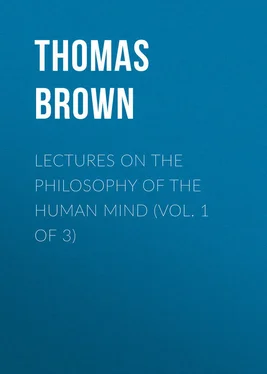Thomas Brown - Lectures on the Philosophy of the Human Mind (Vol. 1 of 3)
Здесь есть возможность читать онлайн «Thomas Brown - Lectures on the Philosophy of the Human Mind (Vol. 1 of 3)» — ознакомительный отрывок электронной книги совершенно бесплатно, а после прочтения отрывка купить полную версию. В некоторых случаях можно слушать аудио, скачать через торрент в формате fb2 и присутствует краткое содержание. Жанр: foreign_antique, foreign_prose, на английском языке. Описание произведения, (предисловие) а так же отзывы посетителей доступны на портале библиотеки ЛибКат.
- Название:Lectures on the Philosophy of the Human Mind (Vol. 1 of 3)
- Автор:
- Жанр:
- Год:неизвестен
- ISBN:нет данных
- Рейтинг книги:5 / 5. Голосов: 1
-
Избранное:Добавить в избранное
- Отзывы:
-
Ваша оценка:
- 100
- 1
- 2
- 3
- 4
- 5
Lectures on the Philosophy of the Human Mind (Vol. 1 of 3): краткое содержание, описание и аннотация
Предлагаем к чтению аннотацию, описание, краткое содержание или предисловие (зависит от того, что написал сам автор книги «Lectures on the Philosophy of the Human Mind (Vol. 1 of 3)»). Если вы не нашли необходимую информацию о книге — напишите в комментариях, мы постараемся отыскать её.
Lectures on the Philosophy of the Human Mind (Vol. 1 of 3) — читать онлайн ознакомительный отрывок
Ниже представлен текст книги, разбитый по страницам. Система сохранения места последней прочитанной страницы, позволяет с удобством читать онлайн бесплатно книгу «Lectures on the Philosophy of the Human Mind (Vol. 1 of 3)», без необходимости каждый раз заново искать на чём Вы остановились. Поставьте закладку, и сможете в любой момент перейти на страницу, на которой закончили чтение.
Интервал:
Закладка:
It is more immediately our present purpose to consider, What it truly is which is the object of inquiry, when we examine the physical successions of events, in whatever manner the belief of their similarity of sequence may have arisen? Is it the mere series of regular antecedents and consequents themselves? or, Is it any thing more mysterious, which must be supposed to intervene and connect them by some invisible bondage?
We see, in nature, one event followed by another. The fall of a spark on gunpowder, for example, followed by the deflagration of the gunpowder; and, by a peculiar tendency of our constitution, which we must take for granted, whatever be our theory of power, we believe, that as long as all the circumstances continue the same, the sequence of events will continue the same; that the deflagration of gunpowder, for example, will be the invariable consequence of the fall of a spark on it; – in other words, we believe the gunpowder to be susceptible of deflagration on the application of a spark, – and a spark to have the power of deflagrating gunpowder.
There is nothing more, then, understood in the trains of events, however regular, than the regular order of antecedents and consequents which compose the train; and between which, if any thing else existed, it would itself be a part of the train. All that we mean, when we ascribe to one substance a susceptibility of being affected by another substance, is, that a certain change will uniformly take place in it when that other is present; – all that we mean, in like manner when we ascribe to one substance a power of affecting another substance, is, that, when it is present a certain change will uniformly take place in that other substance. Power, in short, is significant not of any thing different from the invariable antecedent itself, but of the mere invariableness of the order of its appearance in reference to some invariable consequent, – the invariable antecedent being denominated a cause , the invariable consequent an effect . To say, that water has the power of dissolving salt, and to say, that salt will always melt when water is poured upon it, are to say precisely the same thing; – there is nothing in the one proposition, which is not exactly, and to the same extent, enunciated in the other.
It would, indeed, be a very different theory of causation, if, without taking into account the important circumstance of invariableness or the uniform certainty of being at all times followed by a particular event, we were to say, that power is mere antecedence; for there can be no question, that phenomena precede other phenomena, which we never consider as having any permanent relation to them. They are regarded as antecedents, but not invariable antecedents, and the reason of this is obvious. Innumerable events are constantly taking place together in the immense system of the universe. There must, therefore, always be innumerable co-existing series, the parts of each of which, though permanently related to each other, may have no permanent relation to the parts of the other series; and one event of one series, may thus precede, not its own effect merely, which is to be its constant and uniform attendant, in all similar circumstances, but the events also of other co-existing series, which may never occur with it again at the same moment. There is no superstition in believing that an eclipse may be followed by a pestilence, or an unpleasant dream by some unforeseen calamity of the day, though there would be much superstition in believing, that these antecedents and consequents had any permanent relation to each other. In ordinary and familiar cases, at least, every one knows sufficiently the distinction of what is thus casual only, and what is invariable in the order of nature. Yet it is only by losing all sight of a distinction so very obvious, and confounding invariable with casual consequences, that Dr Reid, and other eminent philosophers, have been led into much laborious argumentation, in the confidence of confuting one of the simplest and justest of metaphysical opinions. To prove that power is more than invariable antecedence, they prove that it is more than casual antecedence, and that events do not follow each other, loosely and confusedly, as if antecedents could be invariable, which had not consequents as invariable, or, as if an uniform series were not merely another name for a number of uniform antecedents and consequents. A cause is, perhaps, not that which has merely once preceded an event; but we give the name to that which has always been followed by a certain event, is followed by a certain event, and according to our belief, will continue to be in future followed by that event, as its immediate consequent; and causation, power, or any other synonymous words which we may use, express nothing more than this permanent relation of that which has preceded to that which has followed. If this invariableness of succession, past, present, and future, be not that which constitutes one event the effect of another, Dr Reid, at least, has not pointed out any additional circumstance which we must combine with it, in our definition of an effect, though he has shown, indeed, with most abundant evidence, if any evidence at all were necessary, that the antecedents and consequents are not the same; that we use active and passive verbs, in different senses, applying, as might well be supposed, the one to the antecedent, the other to the consequent; that we speak of effects and causes as if truly different, since it is unquestionably not the same thing to follow uniformly a certain change, and to precede uniformly a certain change, and that we never think of giving those names where we do not conceive that there is some permanent relation. But, though these distinctions might be allowed to have irresistible weight, in opposition to the scepticism, if such extravagant scepticism there ever were, which affirmed the sequences of events to be altogether casual and irregular, they are surely of no weight against that simple definition of power, which affirms it to consist in the probability of the invariable sequence . of some event as its immediate consequent ; since this very regularity of the sequences, which is supposed by the definition, must, of itself, have given occasion to all those distinctions of thought and language which Dr Reid has adduced.
That one event should invariably be followed by another event, is indeed, it will be allowed, as every thing in nature is, most wonderful, and can be ascribed only to the infinite source of every thing wonderful and sublime; the will of that divine Being, who gave the universe its laws, and who formed these with a most beneficent arrangement for the happiness of his creatures, who, without a belief in the uniformity of these laws, to direct their conduct, could not have known how to preserve even their animal existence. But the uniformity of succession is surely not rendered less wonderful, by a mere change of name. It is the same unaltered wonder still, when we ascribe the term power to the prior of two events, as when we ascribe to it the exactly synonymous phrase invariableness of antecedence ; each of these terms implying nothing more than that the one event cannot take place without being immediately followed by the other. The permanence and uniformity of the relation are the essential circumstances. To be that which cannot exist, without being instantly followed by a certain event, is to be the cause of the event , as a correlative effect . It is impossible for us to believe, that the invariable antecedent is any thing but the cause, or the cause any thing but the invariable antecedent; as it is impossible for us to believe that homo is the Latin synonime of man , and yet that man is not the English synonime of homo .
Читать дальшеИнтервал:
Закладка:
Похожие книги на «Lectures on the Philosophy of the Human Mind (Vol. 1 of 3)»
Представляем Вашему вниманию похожие книги на «Lectures on the Philosophy of the Human Mind (Vol. 1 of 3)» списком для выбора. Мы отобрали схожую по названию и смыслу литературу в надежде предоставить читателям больше вариантов отыскать новые, интересные, ещё непрочитанные произведения.
Обсуждение, отзывы о книге «Lectures on the Philosophy of the Human Mind (Vol. 1 of 3)» и просто собственные мнения читателей. Оставьте ваши комментарии, напишите, что Вы думаете о произведении, его смысле или главных героях. Укажите что конкретно понравилось, а что нет, и почему Вы так считаете.












![Anne Blunt - A Pilgrimage to Nejd, the Cradle of the Arab Race. Vol. 1 [of 2]](/books/749489/anne-blunt-a-pilgrimage-to-nejd-the-cradle-of-the-thumb.webp)